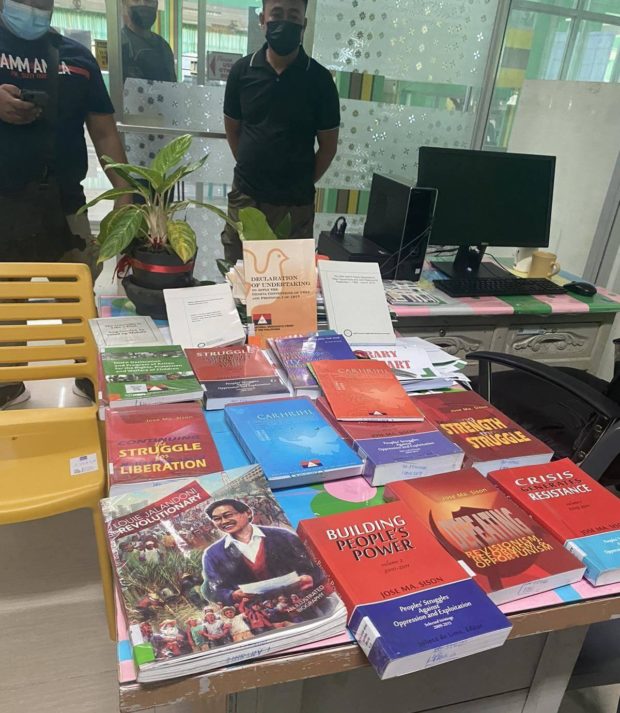
PURGE CONTINUES: Isabela State University campuses are removing all books by Jose Maria Sison, Communist Party of the Philippines founding chair, and handbooks of the National Democratic Front of the Philippines from their libraries. The purging, which started on Sept. 1 at the Kalinga State University, is purportedly meant to “protect” students from insurgent thoughts. (Photo courtesy of ISU-ECHAGUE)
ECHAGUE, Isabela, Philippines — After the Kalinga State University (KSU), the Isabela State University (ISU) has become the second public school in the Philippines to purge books authored by or related to the communist movement in the country supposedly to “protect” the youth and students from insurgent ideology.
ISU president Ricmar Aquino said he had directed the ISU’s main campus in Echague town and 10 other campuses in the province to pull out of their libraries handbooks from the National Democratic Front of the Philippines (NDFP) and books by Jose Maria Sison, the self-exiled founding chair of the Communist Party of the Philippines (CPP).
“ISU supports the government’s ‘whole-of-nation’ approach to [communist insurgency]. As an academic institution, ISU has its mandate to protect the Filipino youth and ensure their future by providing them quality and relevant education,” Aquino told the Inquirer by phone on Tuesday.
Turned over to Nica
The ISU library pulled out 23 NDFP handbooks and works by Sison, including “Building People’s Power,” “Defeating Revisionism & Opportunism,” “Crisis Generates Resistance,” “Building Strength through Struggle” and “Continuing the Struggle for Liberation.”
The move came three weeks after KSU in nearby Tabuk City removed several reference materials on the aborted peace negotiations between the Government of the Republic of the Philippines (GRP) and the NDFP.
Aquino said the books were turned over on Monday to Dennis Godfrey Gammad, regional director of the National Intelligence Coordinating Agency (Nica). The agency directs, coordinates and integrates all national intelligence activities.
He said the books would be brought to the Nica office for safekeeping.
Col. Leandro Abeleda, deputy commander of the Army’s 501st Infantry Brigade (IB), witnessed the turnover at the ISU library.
According to Aquino, the decision to ban these books from the ISU libraries is part of its commitment to “protect the university and its students from the harm that the communists might inflict.”
‘Save our youth’
“Our students should not be exposed to anything that will destroy their future,” Aquino added.
In a statement, Brig. Gen. Danilo Benavides, commander of the 501st IB, said withdrawing the NDFP books from the ISU “will save our youth” from being recruited by the CPP, its armed wing, the New People’s Army (NPA), and the NDFP.
“The action of the officials and leadership of the ISU indicates that they are against the CPP-NPA-NDF ideologies and want to safeguard the institution from communist infiltration,” Benavides said.
He said the move would help put an end to the communist insurgency in the region, one of the goals of the National Task Force to End Local Communist Armed Conflict.
Gammad praised the university’s move, saying that “libraries play a fundamental role in society.”
“The books you read become part of you. Therefore, commitment and accountabilities lie in every page you read,” Gammad said during the turnover.
On Sept. 1, a group of policemen and soldiers inspected the library of the KSU Bulanao Campus in Tabuk and removed the NDFP pamphlets and books from the shelves and took these with them, according to Evangeline Cabello, chief librarian of KSU.
She said she decided to remove the books to “protect [the students] from being recruited to join communist groups.”
Human rights pact
Among the books that were pulled out from the KSU library was the GRP-NDFP Comprehensive Agreement on Respect for Human Rights and International Humanitarian Law.
Unlike ISU, which handed over the books to Nica, KSU kept the books “somewhere else,” Cabello said.
She said she was of two minds about her action.
“I acted on my own … but with personal reservations because I think some of those books should not have been removed from the library,” she said.
The human rights group Karapatan had denounced KSU’s actions, saying removing the books would restrict free speech, academic freedom and information on the peace negotiations and the armed conflict in the country.
The Department of Education and the Commission on Higher Education have not commented on the purging of the books.

